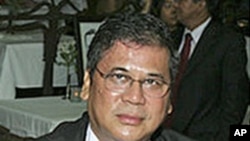A senior Burmese diplomat has announced his defection in the United States, saying he has lost hope that his country's leaders will effect democratic change in the foreseeable future.
Kyaw Win, the second-ranking official at the Burmese embassy in Washington, says in a July 4 letter to U.S. Secretary of State Hillary Clinton that his efforts to push for reform have been rejected and he fears prosecution if he returns to Burma.
In the letter, he urges the United States to maintain targeted economic sanctions against the Burmese leaders and their businessmen allies, and to press for an international council of inquiry to investigate Burmese human rights abuses.
The diplomat confirmed his resignation and request of asylum in the United States by telephone to a reporter for VOA's Burmese service.
Kyaw Win is a career diplomat with 31 years experience who has served in major Burmese embassies from India to Brazil. He is also seeking asylum for his wife and three adult children, all of whom are living in the United States.
|
Listen to analysis by Monique Skidmore, professor at the University of Canberra |
In his letter, Kyaw Win says he had hoped that, over time, Burma's military would ease its grip on power and move Burma to greater political pluralism. But, he says, the military has retained its hold on uncontested power in spite of elections last year that brought in a nominally civilian leadership.
He says that in reality, senior military officials are seeking "to stamp out the voices of those seeking democracy, human rights and individual liberties." He says war against the nation's ethnic minorities is "imminent" and threats against pro-democracy leader Aung San Suu Kyi must be taken seriously.
Kyaw Win appears to be referring to recent warnings of potential "chaos" if Aung San Suu Kyi goes ahead with a planned national tour this month. When she attempted a tour of upper Burma in 2003, government thugs attacked her motorcade, killing numerous people.
The diplomat says that during his time in Washington, he has tried to build bridges between the Burmese government and the international community. But, he says, his recommendations have been continually rejected and he is now considered "dangerous" by his own government.
Kyaw Win says the United States has played a special role in standing up for freedom and democracy in his country. He urges Secretary Clinton to facilitate the creation of an international body to investigate human rights abuses perpetrated in Burma's conflict zones by the military and other armed groups.
He also says that highly targeted economic sanctions can play a "critical role" in keeping the Burmese leaders and the businessmen who live off of them from having access to the international financial system.




